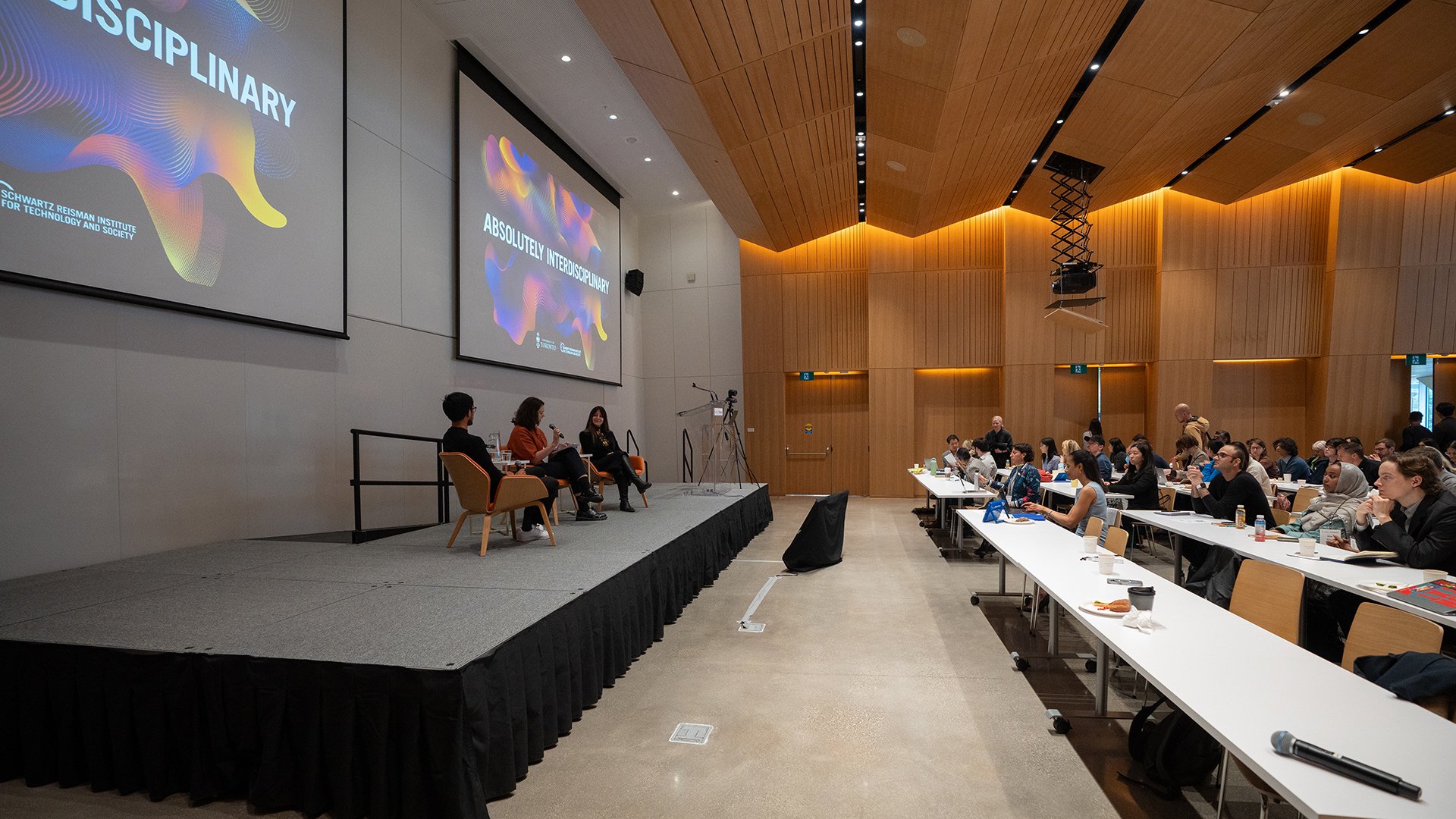WHAT’S HAPPENING
Here’s what we’re thinking about, talking about, and working on at the Schwartz Reisman Institute.
Absolutely Interdisciplinary 2025 explores new frontiers in AI research
At SRI’s annual conference, participants discussed future directions and key challenges in AI research, including the complexities of aligning advanced AI with human values and interdisciplinary perspectives on AI safety.
Absolutely Interdisciplinary returns to explore new frontiers in AI research
The Schwartz Reisman Institute’s annual academic conference Absolutely Interdisciplinary returns for 2025 to explore interdisciplinary approaches to AI governance, risk and safety.
Absolutely Interdisciplinary 2024 fosters innovation and collaboration
At SRI’s annual academic conference, leading researchers from diverse fields came together to tackle the complexities of AI alignment and how to better understand the social impacts of data-driven technologies. 28 distinguished speakers presented new approaches and ideas to better understand how these technologies are impacting our world.
SRI’s annual conference, Absolutely Interdisciplinary, returns in May of 2024
The Schwartz Reisman Institute’s annual academic conference will take place May 6–8, 2024, with select sessions taking place in the newly-completed Schwartz Reisman Innovation Campus located in the heart of Toronto’s Discovery District. Speakers include: Peter Railton, Harper Reed, Huili Chen, Ray Perrault, Gillian Hadfield, and more.
What is the future of AI alignment?
At Absolutely Interdisciplinary 2023, Richard Sutton discussed the future of AI systems and whether they should always be aligned with human values. In a wide-ranging discussion with Blaise Agüera y Arcas and Gillian Hadfield, Sutton argued that it may be desirable—and even necessary—for us to one day grant autonomy to advanced AI agents.
Can we reverse engineer our social behaviour using AI?
SRI Faculty Fellow William Cunningham and Joel Leibo of Google DeepMind presented their work on testing social cognitive theory using reinforcement learning at the Schwartz Reisman Institute’s conference Absolutely Interdisciplinary.
Unraveling the reward hypothesis: A peek into human and machine decision-making processes
In a session at the Schwartz Reisman Institute’s annual academic conference, Richard Sutton (Amii) and Julia Haas (DeepMind) discussed the legacy of Sutton’s reward hypothesis and the interplay between rewards, decision-making, and moral cognition.
New research on training decision-making AI reveals insights into normative judgments
A new paper by Aparna Balagopalan, David Madras, David H. Yang, Dylan Hadfield-Menell, Gillian Hadfield, and Marzyeh Ghassemi describes how decisions made by machine learning models can be improved by labelling data that explicitly reflects value judgments.
SRI announces postdoctoral research fellowship to explore human normative systems
Are you a scholar with a PhD in a computational discipline? The Schwartz Reisman Institute is hiring a new postdoctoral fellow to engage in a research program headed by Gillian Hadfield that will explore the phenomenon of human normativity and group coordination.
Hope, faith, and stories: What betting, witchcraft, and craftsmanship in rural Bangladesh teaches us about ethical pluralism and decolonizing AI
In a recent SRI Seminar, Faculty Fellow Syed Ishtiaque Ahmed demonstrated how the dominant model of AI ethics is insufficient to strengthen the voices of local communities in the Global South. Ahmed contends scholars should move away from “universal” notions of intelligence, and foster situated ethical practices that take into account local hopes, faith, and stories.
New ideas and connections as Absolutely Interdisciplinary takes off
Absolutely Interdisciplinary 2021 brought together over 270 participants from around the world, to explore the theme of “Human and Machine Normativity: New Connections.” The conference brought together researchers working on similar questions from a variety of disciplines in order to map out new terrain for thinking about human and machine normativity.
We’re hiring! Join SRI as a postdoctoral fellow in computational behavioural modeling and analysis
Are you a scholar with a PhD in a computational discipline? The Schwartz Reisman Institute is hiring a new postdoctoral fellow to engage in a research program headed by Gillian Hadfield that will explore the phenomenon of human normativity and group coordination.











